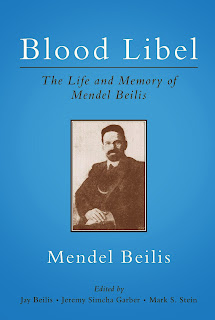One of the great trials of the twentieth century was the 1913 blood-libel trial of Mendel Beilis in Czarist Russia. Beilis, a Jew, was arrested in 1911 by the Czarist secret police. He was accused of ritually murdering a Christian boy in order to use the boy’s blood to bake matzah for Passover. Beilis was jailed for over two years, under horrible conditions, while awaiting trial. He heroically resisted all pressure to implicate himself or other Jews. In 1913, after a dramatic trial that riveted the Jewish people and much of the rest of the world, Beilis was acquitted by an all-Christian jury.
Blood Libel: The Life and
Memory of Mendel Beilis includes the gripping memoir of Mendel Beilis, in its
first complete English translation. Also included is an essay claiming that
Bernard Malamud plagiarized from Beilis’s memoir in writing his Pulitzer
Prize-winning novel The Fixer.
Buy on Amazon.com Paperback $14, Kindle $3
Read the first 12 chapters of the memoir of Mendel Beilis,
The Story of My Sufferings – FREE
Read our article in Tablet Magazine
on Bernard Malamud’s debt to Beilis – FREE
BLURBS AND REVIEWS:
“The account by Beilis himself has all the elements of a Hollywood script, only better…. The victory comes… in a
nail-biter.”
– New Jersey Jewish Standard, May 18, 2012
“The man Beilis endured these severe tests in a spirit of
truth and righteousness, fortified by the sanctity of Judaism, and with an
unwavering conviction that his hands were innocent and clean. He emerged with honor, crowned with the wreath
of victory…. His honor was also that of
our entire nation and the honor of the holy and pure Torah…. And behold, [he
has] printed this book to tell generations to come all that happened to him
with abiding truth and unflagging faith….”
– Abraham Isaac Kook, Ashkenazi Chief Rabbi of Palestine under the
British Mandate [from the 1931 Second Yiddish edition]
“The Mendel Beilis trial was one of the most important
events of the pre-1917 period in Russia, and certainly the most
celebrated and notorious legal trial of that period. Beilis’s historic and
electrifying memoir deserves to be widely read. The editors furthermore make a
convincing case that in writing his novel The
Fixer, Bernard Malamud directly borrowed important turns of speech,
descriptions and ideas from Beilis, and that he should have acknowledged doing
so.”
– Professor John MacKay, Yale University
“The memoir of Mendel Beilis is a fast-paced thriller of
crime, hysteria, and attempted judicial murder; as always, fact is far stranger
than fiction. The memoir reflects well on its author, who neither wallows in
self-pity nor in hatred of his enemies.”
– Professor James Bernard Murphy, Dartmouth College
“Aside from the expert editing, the most important new
feature in this edition is the essay ‘Pulitzer Plagiarism: What Bernard
Malamud’s The Fixer Owes to the
Memoir of Mendel Beilis.’ The extent to which Malamud lifted lengthy passages
from Beilis’s account of his imprisonment is much too great to be justified by
artistic freedom. But one can understand Malamud’s temptation: Beilis’s
description has great power, in part because of its simplicity, its graphic
details. This modern Job, an ordinary Jew hit by a lightning bolt of bad
fortune, asks ‘Why me?’ His neighbors asked the same, since ‘our Mendel,’ they
all affirmed, was such a likeable sort — with supportive friendships, bizarre
as it seems, that included members of the anti-Semitic Black Hundreds and the
Orthodox priest of the area. The Beilis Affair, now largely forgotten, gripped
Czarist Russia perhaps even more potently than the Dreyfus Affair had gripped France. Readers, ordinary and scholarly, will find
Beilis’s story fascinating, and in many regards surprising.”
– Professor Albert S. Lindemann, University
of California, Santa Barbara, author of The Jew Accused: Three Anti-Semitic Affairs (Cambridge University
Press, 1991)
“On the centenary of Mendel Beilis’s arrest and trial in
Czarist Russia, there can be no finer testament to his memory than to let him
speak to us in his own words. The present edition accomplishes this with
admirable thoroughness and skill, making available the fullest translation of
Beilis’s memoirs into English to date. Those who only know this martyr to
bigotry from the Bernard Malamud novel will have a revelatory experience when
they read Beilis’s own gripping and heart-rending account of his sufferings.”
– Professor Richard S. Levy, University of Illinois
at Chicago, editor of Antisemitism: A
Historical Encyclopedia of Prejudice and Persecution (ABC-CLIO, 2005) 